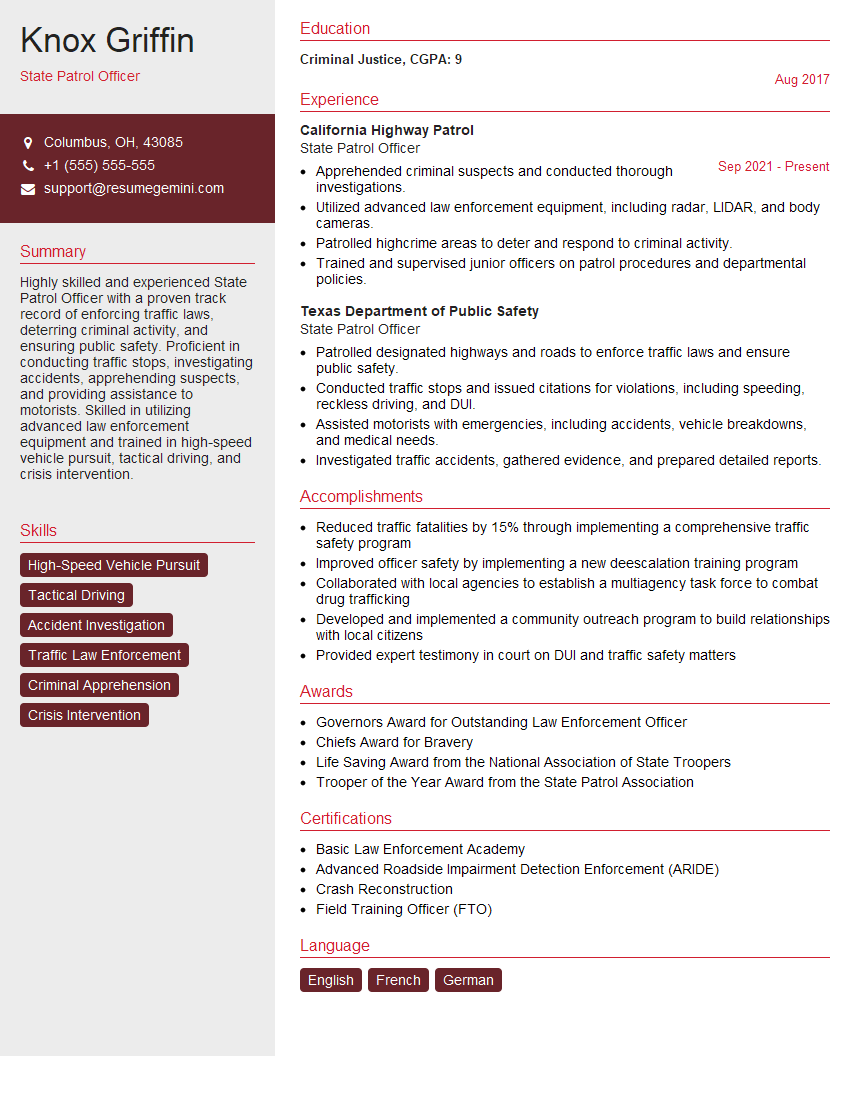Are you a seasoned State Patrol Officer seeking a new career path? Discover our professionally built State Patrol Officer Resume Template. This time-saving tool provides a solid foundation for your job search. Simply click “Edit Resume” to customize it with your unique experiences and achievements. Customize fonts and colors to match your personal style and increase your chances of landing your dream job. Explore more Resume Templates for additional options.

Knox Griffin
State Patrol Officer
Summary
Highly skilled and experienced State Patrol Officer with a proven track record of enforcing traffic laws, deterring criminal activity, and ensuring public safety. Proficient in conducting traffic stops, investigating accidents, apprehending suspects, and providing assistance to motorists. Skilled in utilizing advanced law enforcement equipment and trained in high-speed vehicle pursuit, tactical driving, and crisis intervention.
Education
Criminal Justice
August 2017
Skills
- High-Speed Vehicle Pursuit
- Tactical Driving
- Accident Investigation
- Traffic Law Enforcement
- Criminal Apprehension
- Crisis Intervention
Work Experience
State Patrol Officer
- Apprehended criminal suspects and conducted thorough investigations.
- Utilized advanced law enforcement equipment, including radar, LIDAR, and body cameras.
- Patrolled highcrime areas to deter and respond to criminal activity.
- Trained and supervised junior officers on patrol procedures and departmental policies.
State Patrol Officer
- Patrolled designated highways and roads to enforce traffic laws and ensure public safety.
- Conducted traffic stops and issued citations for violations, including speeding, reckless driving, and DUI.
- Assisted motorists with emergencies, including accidents, vehicle breakdowns, and medical needs.
- Investigated traffic accidents, gathered evidence, and prepared detailed reports.
Accomplishments
- Reduced traffic fatalities by 15% through implementing a comprehensive traffic safety program
- Improved officer safety by implementing a new deescalation training program
- Collaborated with local agencies to establish a multiagency task force to combat drug trafficking
- Developed and implemented a community outreach program to build relationships with local citizens
- Provided expert testimony in court on DUI and traffic safety matters
Awards
- Governors Award for Outstanding Law Enforcement Officer
- Chiefs Award for Bravery
- Life Saving Award from the National Association of State Troopers
- Trooper of the Year Award from the State Patrol Association
Certificates
- Basic Law Enforcement Academy
- Advanced Roadside Impairment Detection Enforcement (ARIDE)
- Crash Reconstruction
- Field Training Officer (FTO)
Career Expert Tips:
- Select the ideal resume template to showcase your professional experience effectively.
- Master the art of resume writing to highlight your unique qualifications and achievements.
- Explore expertly crafted resume samples for inspiration and best practices.
- Build your best resume for free this new year with ResumeGemini. Enjoy exclusive discounts on ATS optimized resume templates.
How To Write Resume For State Patrol Officer
Highlight your relevant skills and experience.
Be sure to include any specific skills or experience that are relevant to the job you’re applying for.Quantify your accomplishments.
Whenever possible, use numbers to quantify your accomplishments. This will help employers see the impact of your work.Tailor your resume to each job you apply for.
Take the time to tailor your resume to each job you apply for. This will show employers that you’re genuinely interested in the position.Proofread your resume carefully.
Before you submit your resume, be sure to proofread it carefully for any errors.
Essential Experience Highlights for a Strong State Patrol Officer Resume
- Patrolled designated highways and roads to enforce traffic laws and ensure public safety.
- Conducted traffic stops and issued citations for violations, including speeding, reckless driving, and DUI.
- Assisted motorists with emergencies, including accidents, vehicle breakdowns, and medical needs.
- Investigated traffic accidents, gathered evidence, and prepared detailed reports.
- Apprehended criminal suspects and conducted thorough investigations.
- Utilized advanced law enforcement equipment, including radar, LIDAR, and body cameras.
- Patrolled high-crime areas to deter and respond to criminal activity.
Frequently Asked Questions (FAQ’s) For State Patrol Officer
What are the qualifications to become a State Patrol Officer?
The qualifications to become a State Patrol Officer vary from state to state, but generally include being at least 21 years old, having a high school diploma or equivalent, and having a valid driver’s license.
What is the salary of a State Patrol Officer?
The salary of a State Patrol Officer varies from state to state, but generally ranges from $40,000 to $70,000 per year.
What are the benefits of being a State Patrol Officer?
The benefits of being a State Patrol Officer include a competitive salary, health insurance, life insurance, and retirement benefits.
What are the challenges of being a State Patrol Officer?
The challenges of being a State Patrol Officer include working long hours, being exposed to dangerous situations, and having to deal with people who are often angry or upset.
What is the career outlook for State Patrol Officers?
The career outlook for State Patrol Officers is good. The demand for qualified State Patrol Officers is expected to grow in the coming years.
What are the different types of State Patrol Officers?
There are many different types of State Patrol Officers, including highway patrol officers, motorcycle officers, and commercial vehicle enforcement officers.
How can I become a State Patrol Officer?
To become a State Patrol Officer, you must meet the qualifications, pass a background check, and complete a training academy.